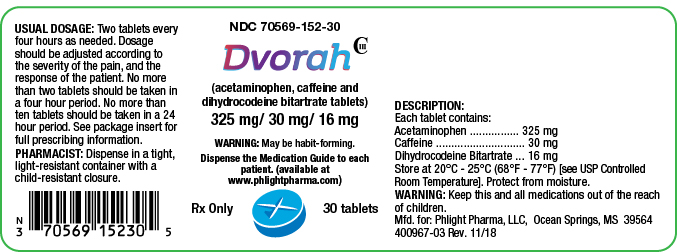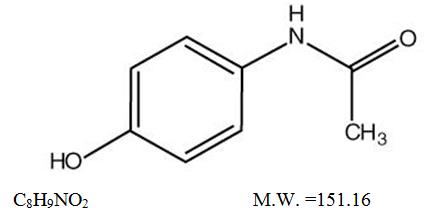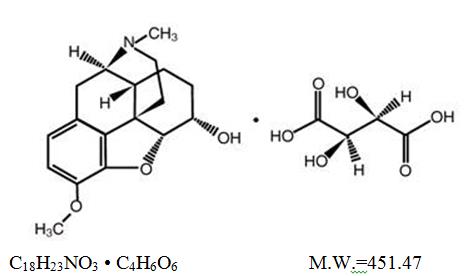
Dvorah | Acetaminophen, Caffeine And Dihydrocodeine Bitartrate Tablet while Breastfeeding
What is Dvorah | Acetaminophen, Caffeine And Dihydrocodeine Bitartrate Tablet used for?
Is using Dvorah | Acetaminophen, Caffeine And Dihydrocodeine Bitartrate Tablet safe or dangerous while breastfeeding?

Nursing Mothers Dihydrocodeine bitartrate and its active metabolite, morphine, are present in human milk. There are published studies and cases that have reported excessive sedation, respiratory depression, and death in infants exposed to codeine via breast milk. Women who are ultra-rapid metabolizers of dihydrocodeine achieve higher than expected serum levels of morphine, potentially leading to higher levels of morphine in breast milk that can be dangerous in their breastfed infants. In women with normal dihydrocodeine metabolism (normal CYP2D6 activity), the amount of dihydrocodeine secreted into human milk is low and dose-dependent. There is no information on the effects of the dihydrocodeine on milk production. Because of the potential for serious adverse reactions, including excess sedation, respiratory depression, and death in a breastfed infant, advise patients that breastfeeding is not recommended during treatment with DVORAH [see WARNINGS ]. Clinical Considerations If infants are exposed to DVORAH through breast milk, they should be monitored for excess sedation and respiratory depression. Withdrawal symptoms can occur in breastfed infants when maternal administration of an opioid analgesic is stopped, or when breast-feeding is stopped. Acetaminophen and caffeine are also excreted in breast milk in small amounts. Because of the potential for serious adverse reactions in nursing infants from this combination product, a decision should be made whether to discontinue nursing or to discontinue the drug, taking into account the importance of the drug to the mother.
Dvorah | Acetaminophen, Caffeine And Dihydrocodeine Bitartrate Tablet Breastfeeding Analsys
Acetaminophen while Breastfeeding
SafeCAS Number: 103-90-2
Excreted in very low amount into breast milk. Infant intake may be lower than 4% of usual pediatric dose. The American Academy of Pediatrics rates it as compatible with Breastfeeding.
Caffeine while Breastfeeding
Low RiskCAS Number: 58-08-2
Trimethylxanthine component which is present in many compounds like decongestant or pain relief drugs (50 to 100 mg per unit) . It is also present in many infusion beverages (coffee, tea, mate, guarana) and other drinks with allegedly energizing properties. See also Coffee, Caffeine (beverages). At a dose higher than 300 mg a-day may induce nervousness and irritability in the infant. Intravenous high doses used to treat post-epidural anesthesia headache within 2-3 days after delivery, before mature breast milk comes, are compatible with breastfeeding. High doses used Intravenously to treat headache related to epidural should be regarded as compatible with breastfeeding only in the 2-3 days before milk comes in. Elimination period may last from few hours in adults, to 3-4 days in the newborn infant. American Academy of Pediatrics: Maternal Medication Usually Compatible With Breastfeeding.
Dihydrocodeine bitartrate while Breastfeeding
Low RiskCAS Number: 125-28-0

Used for pain and cough relief. As analgesic it is not more effective than Ibuprofen. The enzyme cytochrome P450-CYP2D6 catalyzes its metabolization into dehydromorphine. On date of latest update relevant data concerning breastfeeding were not found. Product with similar characteristics than Codeine but with lower oral bioavailability which would be advantageous for breastfed infants. Codeine is excreted into breast milk in non-significant amount, however, serious health problems have appeared among off-spring of mothers who are rapid metabolizers from Codeine to Morphine. Discontinue if excessive sedation appears in mother or infant, and, do not administer if such a background in mother or family is present, as there are between 1% and 29% of people who are rapid metabolizers from codeine to morphine with an excess of the gene linked to enzyme P450-CYP2D6.
Dvorah | Acetaminophen, Caffeine And Dihydrocodeine Bitartrate Tablet Breastfeeding Analsys - 2
Acetaminophen while Breastfeeding
CAS Number: 103-90-2
Acetaminophen is a good choice for analgesia, and fever reduction in nursing mothers. Amounts in milk are much less than doses usually given to infants. Adverse effects in breastfed infants appear to be rare.
Caffeine while Breastfeeding
CAS Number: 58-08-2
Caffeine appears in breastmilk rapidly after maternal ingestion. Insufficient high-quality data are available to make good evidence-based recommendations on safe maternal caffeine consumption.[1] Fussiness, jitteriness and poor sleep patterns have been reported in the infants of mothers with very high caffeine intakes equivalent to about 10 or more cups of coffee daily. Studies in mothers taking 5 cups of coffee daily found no stimulation in breastfed infants 3 weeks of age and older. Some experts feel that a maternal intake limit of 300 mg daily might be a safe level of intake.[2] However, preterm and younger newborn infants metabolize caffeine very slowly and may have serum levels of caffeine and other active caffeine metabolites similar to their mothers' levels,[2][3][4] so a lower intake level preferable in the mothers of these infants. Other sources of caffeine, such as cola and energy drinks, yerba mate or guarana, will have similar dose-related effects on the breastfed infant. Coffee intake of more than 450 mL daily may decrease breastmilk iron concentrations and result in mild iron deficiency anemia in some breastfed infants.[5]
Dihydrocodeine bitartrate while Breastfeeding
CAS Number: 125-28-0

Maternal use of oral narcotics during breastfeeding can cause infant drowsiness, central nervous system (CNS) depression and even death. Like codeine, pharmacogenetics probably plays a role in the extent of CNS depression. Newborn infants seem to be particularly sensitive to the effects of even small dosages of narcotic analgesics. Dihydrocodeine possibly caused severe respiratory depression in one newborn infant whose mother was taking the drug for cough. Once the mother's milk comes in, it is best to provide pain control with a nonnarcotic analgesic and limit maternal intake of hydromorphone to a few days at a low dosage with close infant monitoring. If the baby shows signs of increased sleepiness (more than usual), difficulty breastfeeding, breathing difficulties, or limpness, a physician should be contacted immediately. Because there is little published experience with dihydrocodine during breastfeeding, an alternate drug may be preferred, especially while nursing a newborn or preterm infant.

I am nursing mother and I have already used Dvorah | Acetaminophen, Caffeine And Dihydrocodeine Bitartrate Tablet, what should I do?
During whole lactation period you shall first discuss with your doctor and then together you shall decide whether you shall take that drug or not however if you have already taken Dvorah | Acetaminophen, Caffeine And Dihydrocodeine Bitartrate Tablet then you shall inform your doctor, But you should not be worried too much as Dvorah | Acetaminophen, Caffeine And Dihydrocodeine Bitartrate Tablet comes in category of low risk drug.
My doctor has prescribed me Dvorah | Acetaminophen, Caffeine And Dihydrocodeine Bitartrate Tablet, what should I do?
Dvorah | Acetaminophen, Caffeine And Dihydrocodeine Bitartrate Tablet comes in category of low risk and if your doctor is aware that you are breastfeeding it should be ok to use
If I am using Dvorah | Acetaminophen, Caffeine And Dihydrocodeine Bitartrate Tablet, will my baby need extra monitoring?
Not much
Who can I talk to if I have questions about usage of Dvorah | Acetaminophen, Caffeine And Dihydrocodeine Bitartrate Tablet in breastfeeding?
US
National Womens Health and Breastfeeding Helpline: 800-994-9662 (TDD 888-220-5446) 9 a.m. and 6 p.m. ET, Monday through Friday
UK
National Breastfeeding Helpline: 0300-100-0212 9.30am to 9.30pm, daily
Association of Breastfeeding Mothers: 0300-330-5453
La Leche League: 0345-120-2918
The Breastfeeding Network supporter line in Bengali and Sylheti: 0300-456-2421
National Childbirth Trust (NCT): 0300-330-0700
Australia
National Breastfeeding Helpline: 1800-686-268 24 hours a day, 7 days a week
Canada
Telehealth Ontario for breastfeeding: 1-866-797-0000 24 hours a day, 7 days a week
